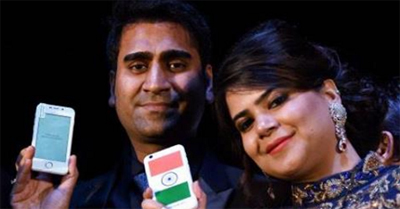New Delhi, Feb 22: Since he announced the launch of a mobile phone for Rs 251, Mohit Goel has faced widespread scepticism, along with visits by police and income tax officials at his rented two-storey office in Noida. However, the Amity University graduate insists that he will not only deliver the phones at the stunning price he has quoted, but also make a profit of Rs 31 on each handset sold.
 "Why am I being hounded? What wrong have I done?" Goel asked in the course of an exclusive interview with TOI. The director of Ringing Bells insists that his new venture is not a fly-by-night operation and will begin customer deliveries from April 15. "Has there ever been a case of income-tax evasion against me or my company, or has there been an FIR filed against me in any police station? Why am I being called a 'bhagora' (who'll run away with the money)? I intend to do a valid business, just like any other startup, and I have a business plan ready."
"Why am I being hounded? What wrong have I done?" Goel asked in the course of an exclusive interview with TOI. The director of Ringing Bells insists that his new venture is not a fly-by-night operation and will begin customer deliveries from April 15. "Has there ever been a case of income-tax evasion against me or my company, or has there been an FIR filed against me in any police station? Why am I being called a 'bhagora' (who'll run away with the money)? I intend to do a valid business, just like any other startup, and I have a business plan ready."
The company claims it has received over 7 crore registrations on its website since it started accepting applications on February 18. "We are taking online bookings for only 25 lakh units in the first batch due to limited supplies, while giving another 25 lakh through offline distributors. I will deliver the handsets before June 30. All the money that we receive from customers through the payment gateway will be kept in an escrow account and we will touch it only when we deliver the devices." The company has an account with ICICI Bank.
Goel, and his much-older confidant Ashok Chadha, who is the president of the company, insists that there have not been any infringements on design and other matters. "Some of the devices had the Adcom branding as we sourced panel (screen) from them. However, the final device will have our branding and the phone will have the same features and design that we had showcased."
The dual SIM Freedom 251 device carries a 4-inch display, 1 GB RAM, 8GB internal memory with a 1.3 GHZ quad-core processor, dual cameras and comes with a charger, headphone and one-year warranty.
The duo say that they have a carefully laid-out business model to manage the disruptive price for the device "The price that works out per device is roughly around Rs 1,500," Chadha says. insists, though significantly lowering it down from the Rs 2,500 he had announced on the day of the unveiling of the device. "We will source the devices from a supplier in Noida, who will be assembling the units for us after getting components from Taiwan." And while we do this, we also start the work to identify land and suppliers for setting up our manufacturing locations. For this, we have identified Noida while also looking at locations in Uttarakhand, West Bengal, Bihar and Punjab," Chadha says.
And just how does he bring down the cost to Rs 251, and also earn a profit? "Economies of scale gets it down to around Rs 1,200, and thereafter an online sales model cuts down marketing and sales expenses, giving us further savings," he says. And to this we will add marketing piggybacks from companies whose applications we load on the devices. We will save around Rs 300 per device more through this," Chadha says.
The unveiling of the phone on February 17 had created quite a flutter among existing handset suppliers, prompting industry body Indian Cellular Association to file a complaint with the government. (ICA) - which has members such as Samsung, Apple, Sony, Lava, Micromax, Karbonn, Motorola and HTC - ICA president Pankaj Mohindroo wrote a letter to telecom minister Ravi Shankar Prasad, expressing doubts about the intentions of Ringing Bells, saying it is not possible to supply a phone for Rs 251. Also, there were allegations that the company had ripped off the design of the prototype from American phone major Apple's iPhone, while also giving out devices sourced from a local electronics importer Adcom.
The company is also talking to large e-commerce companies, such as travel website Goibibo, to get their apps on the devices. "We will also monetize from the heavy traffic on our website and will make it into a marketplace for other brands to hop on. This will also help us to bring down the cost."





Comments
I think battery only original.
Naya chutiyapa..
Duplicate mobile..
fake mobile!!!
Add new comment